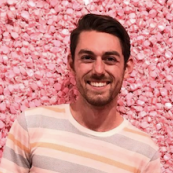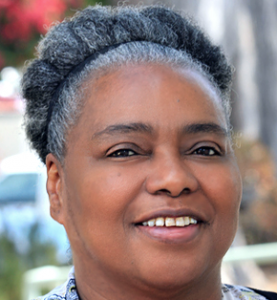This section presents personal stories and experiences of some of our community members. In our inaugural issue we highlight Dollie Pope, JinHuei Dai, Elizabeth Fisher, and Jacob Dwyer.

Jacob Dwyer
MPA Student
Fall 2017-Now
Which one of your identity/ identities would you add in the blank space?
Queer person
How did you experience your identity (as identified above) at MIIS?
On the negative side, I came to MIIS with an expectation that there would be more Queer resources on campus (and in the wider community), and that’s simply not the case. When I arrived to MIIS there was no student club for Queer students, no specific remarks to the Queer community in any institutionally supported information (spare the Diversity session during Orientation), and no classes to explore gender critically, past the binary of man/woman. However, this has, inadvertently, been positive in the end, as it has forced me to take action to make that community for myself. For example, we have started a Queer student group, we are working to make Queer issues more prominent on campus, and I’ve grown in my capacity as an advocate.
Tell us about one memorable concept/ lesson that you learned in connection with your identity or diversity and inclusion broadly from a MIIS community member/s?
One memorable concept that I have deepened my understanding of revolves around the idea of intersectionality, and how it influences conversations on race, gender, and class. This was thanks in large part to the guidance of Professor Pushpa Iyer in both Allies at MIIS and her classes. Through deep conversations with Professor Iyer in class, in Allies at MIIS, and in her office, I have developed a deeper understanding of the formation of different perspectives and how that affects the world you see around you, both of which play a large role in how these conversations about race, gender, class, etc. take place.
How has your time at MIIS prepared you to deal with power and privilege in the world outside of the Institute?
In the past, it was difficult for me to find a voice and stand up when I saw or experienced discrimination directly. However, after work that I have done in Allies at MIIS and my own coursework, I feel like I have found a way to express myself in these instances, and even stand up for myself. Although much of my experience as a Queer person on campus has led to frustration and conflict with those with power and privilege, I feel like it has greater prepared me for dealing with this outside of the Institute. Also, finding this voice has also prepared me to be more of an ally, and using my own privilege to stand up for those even in my own community who still do not have a voice.
What is one suggestion you have for the MIIS community?
As a community we should continue to support one another when concerning issues of diversity and inclusion. When these concerns arise in class, think about what has been said, and their perspective, before jumping to answer with your own perspective. I believe that, if we as a community were to practice this critical self-reflection more, it would lead to a much more cohesive and collaborative MIIS community.

Elizabeth Fisher
MPA Alumna & Member, Allies at MIIS
Fall 2016-2018; Off Campus Jan-August 2018
Which one of your identity/ identities would you add in the blank space?
Woman
How did you experience your identity (as identified above) at MIIS?
At MIIS, my experience of being a woman was, naturally, both positive and negative. In terms of the positive, I was able to build a strong community of like-minded, strong, Feminist women and allies who supported me and who reminded me that there are good people in the world. Whenever there was a clear bias against women expressed inside or outside the classroom, I could always count on several voices to chime in and condemn the sexism, though often this condemnation was expressed in a whisper or in private after that fact. My own experience of sexism or discrimination based on being a woman was not a significant stand-out when I look back on my time at MIIS. Of course, there were the usual subtle and not-so-subtle sexist comments or biases and annoying habits of the manspreading and mansplaining variety. However, in my experience the biggest negative was that I often felt that classes and class discussions were dominated by white men (and to a lesser though still significant extent, white women). MIIS has the opportunity to showcase the voices of people from all over the world of all different identities and intersectionalities, but I feel that this opportunity is often squandered.
Tell us about one memorable concept/ lesson that you learned in connection with your identity or diversity and inclusion broadly from a MIIS community member/s?
I may sound like a broken record through these responses, but the concept that was the most important and thought-provoking to me was how to be aware of and use my power and privilege to create positive and meaningful change in a community and in my own life. I learned concrete tools to address and move forward with this awareness through the sensitivity trainings held by Allies at MIIS, which also helped me to engage in conversations around power and privilege with classmates.
How has your time at MIIS prepared you to deal with power and privilege in the world outside of the Institute?
Power and privilege are two concepts I think about regularly in my daily life outside the Institute because of the education and experiences I had during my program. I left MIIS with a strong conceptual/theoretical understanding of the interplay of power and privilege and how important it is for me to think about them and try to figure out how they affect my professional and personal life. While not all classes touched on these ideas explicitly, my involvement in Allies at MIIS and Intro to Conflict Resolution made sure I was prepared to enter “the real world” with some tools in my belt. My core classes in the MPA program made me think about power and privilege as it relates more specifically to a career in international development, while Allies provided a stronger grounding in how these ideas run through absolutely everything, not just a career abroad. I will say, however, that my classmates did not always have as strong a grasp on these subjects, which I attribute to the fact that I sought out experiences that would increase my knowledge. I am still very much working on my own understanding of power and privilege, and it is because of these experiences at MIIS that I do so.
What is one suggestion you have for the MIIS community?
I would suggest that members of the MIIS community make a conscious effort to participate in a wider range of classes or extracurricular activities, to do things that challenge their preconceived notions and biases. As a white woman, there are unique challenges to living and working abroad (in Cambodia in my case) due predominately to power and privilege. Because I challenged myself while at MIIS, I better understand my own position here and how others view me, as well as how to participate in the local community in a more meaningful way, both personally and professionally.
 Dollie Pope
Dollie Pope
Advancement Coordinator
2001-Present
Which one of your identity/ identities would you add in the blank space?
First and foremost, I identify myself as a human being and in my lifetime I have been the only person of color in my professional environments.
How did you experience your identity (as identified above) at MIIS?
I have been met with some challenges over the 17 years by being a woman of color. I have rarely seen any one on campus on the faculty or staff who looks like me. I have had mixed encounters with individuals within and outside my immediate workplace who see me for my worth and at times have not, but I have always met them head on and persevered.
Tell us about one memorable concept/ lesson that you learned in connection with your identity or diversity and inclusion broadly from a MIIS community member/s?
I work with a few amazing people at MIIS where we can speak freely with one another about the happenings on campus and around the world, without judgement. I strongly believe that judgment has no place when wanting to create a diverse environment.
How has your time at MIIS prepared you to deal with power and privilege in the world outside of the Institute?
I have the fortune to work with our marginalized community in the Monterey County. My time at MIIS has shown me the importance of moving beyond my own perceptions, views of society and move past my uncomfortableness in hopes to make a difference.
What is one suggestion you have for the MIIS community?
For the MIIS community to see a every person through that individual’s preferred lens because a person’s identity should not be viewed as a single story.

JinHuei Dai
Professor and Coordinator of the Chinese Studies Program
June 2006-Present
Which one of your identity/ identities would you add in the blank space?
Mom, Practitioner, Researcher, Taipei-ren (person) in California, American
How did you experience your identity (as identified above) at MIIS?
The intercultural capacity as a mom, a practitioner and a researcher at MIIS allows me to grow as a person to learn from my students, the community and the global affairs. I tend to blend these into my course materials and provide an unique Content-based approach for students to reflect on the relationship of language, culture and cognition. It is the very face of mine, as an ethnic Chinese, as a Language Studies faculty that our status is inferior to other peers with unconscious bias.
Tell us about one memorable concept/ lesson that you learned in connection with your identity or diversity and inclusion broadly from a MIIS community member/s?
I recalled 12 years ago in a LS meeting, where we talked about LS identity at MIIS. I was wondering why? 12 years later, in the world we celebrate diversity and inclusion, we are still talking about the same issue. How could diverse cultures without language participate? How can you have international policy major with proficiency in one language?
How has your time at MIIS prepared you to deal with power and privilege in the world outside of the Institute?
As Sunzi nicely puts it, to know yourself and to know your enemy, is to know your environment. Sometimes, we are not aware that power and privilege are relative in its own confinement. Many of us are already privileged in a sense that we are in a private institute talking about power and privilege. Some of us are judgmental and we call out one group as worse than the other, which in itself, is already not inclusive. As a cognitive linguistic, I am very aware that “words” create image and power that might manipulate our mind. I learned from MIIS that the only way to fight injustice is to be steady and firm about one’s conscience and principles, to create meaningful dialogues, to understand what truly happens around us.
What is one suggestion you have for the MIIS community?
* to have open mind * to construct meaningful conversation * to conduct debates * to be truly diverse and inclusive not just based on your ethnicity, but also celebrate diverse viewpoints.


